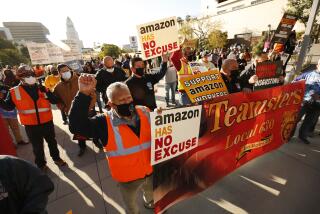Employer Paternalism Isn’t Dead, Just Leaner and Unpredictable
- Share via
AST Research, Kodak and Singer recently announced that they will be firing thousands of employees, thus refuting claims that the wave of corporate downsizings has crested. The Kodak layoffs are especially sobering. For decades, Kodak was a pioneer of enlightened human resource practices, so its downsizing is likely to fuel continued unease in the labor market.
Despite the rising stock market and falling unemployment rate, Americans remain anxious about the availability of “good” jobs: career-type positions that offer decent wages and benefits. Pundits regularly pronounce that global competition and information technology are making those jobs obsolete. Yet many Americans still seek such jobs and nurse a lingering belief that if corporate employers were pushed a little bit harder, they would treat workers better.
Last year, the topic of employer responsibility was a major national issue. Patrick J. Buchanan won the New Hampshire primary by vilifying corporate America for downsizing, and President Clinton convened a White House conference on corporate responsibility. Since then, the issue has moved to the back burner. But it continues to simmer in the consciousness of working Americans, who remember when companies like Kodak offered their employees unconditional security.
It’s important to understand, however, that what we are witnessing is not the death of corporate paternalism by a thousand cuts. Rather, it is a redefinition--on management’s terms--of the corporation’s commitment to its employees. On the one hand, we still have a sizable sector of large, fast-growing firms for which the net benefit of progressive employment practices remains positive. New workers still have to be trained, which makes turnover costly. And employee loyalty is still seen as critical for long-term relations with clients and customers. Even at Kodak, paternalism is not dead; Kodak is one of America’s leading providers of child and elder care benefits to employees.
On the other hand, employers like Kodak now are less willing to shoulder risks. Mass layoffs are one sign of this; other indicators include managed-care health insurance and the shift from defined benefit to defined contribution pensions.
Not everyone feels threatened by these changes. Young, highly educated workers, especially in technology industries, expect to move from job to job. They ask companies only for learning experiences that can be added to their resumes. They seek personal security--medical savings accounts and portable pension plans--instead of group insurance. They represent a throwback to market individualism.
But these workers are an atypical elite. Most Americans still look to their employers as the first line of defense. As that line is pushed back, they question the fairness of today’s leaner, meaner arrangements. Moreover, for every Kodak there are dozens of employers unconcerned with employee commitment: places where pay is low, jobs temporary and benefits shrinking or nonexistent. Layoffs at firms like Kodak give less scrupulous companies a pretext for restructuring the social contract, even when their economic situation does not warrant it.
In short, employer paternalism is not dead, but its contours are changing and most workers lack the power to strike deals more to their liking. That’s reflected in the conundrum of wage stagnation despite high productivity and low unemployment. Back in the 1930s, workers turned to unions and to government in search of a New Deal that would pressure employers to fulfill promises broken during the Depression. While the probability of a union resurgence or new governmental programs seems remote, the issue of employer responsibility is sure to resurface in the next presidential campaign. Buchanan-style populist rhetoric is a strong possibility. The Democrats may dust off the Bingaman-Gephardt proposals to give tax and regulatory preferences to companies that train their workers, give them decent benefits and try to avoid layoffs.
In effect, such legislation would penalize employers who fail to establish or maintain commitments to employees. It’s not a new idea, but has deep roots in American history, as reflected in the tax treatment of employee benefits and the integration of private pensions with Social Security. Ironically, it was a farsighted Kodak executive, Marion Folsom, who in the 1930s helped design these features of the Social Security Act. Above all, what we need today are business leaders like Folsom, who combine a concern for the commonweal with the self-interest that limits us all.
More to Read
Inside the business of entertainment
The Wide Shot brings you news, analysis and insights on everything from streaming wars to production — and what it all means for the future.
You may occasionally receive promotional content from the Los Angeles Times.










